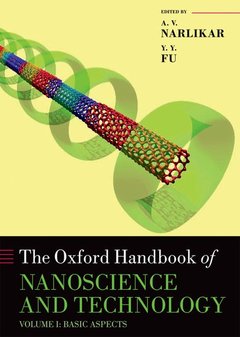Description
Oxford Handbook of Nanoscience and Technology
Volume 1: Basic Aspects
Oxford Handbooks Series
Coordinators: Narlikar A. V., Fu Y.Y.
Language: English
Subjects for Oxford Handbook of Nanoscience and Technology:
Publication date: 02-2010
920 p. · 19.3x25.3 cm · Hardback
920 p. · 19.3x25.3 cm · Hardback
Description
/li>Contents
/li>Biography
/li>
This is an agenda-setting and high-profile book that presents an authoritative and cutting-edge analysis of nanoscience and technology. The Oxford Handbook of Nanoscience and Technology provides a comprehensive and accessible overview of the major achievements in different aspects of this field. The Handbook comprises 3 volumes, structured thematically, with 25 chapters each. Volume I presents fundamental issues of basic physics, chemistry, biochemistry, tribology etc. of nanomaterials. Volume II focuses on the progress made with host of nanomaterials including DNA and protein based nanostructures. Volume III highlights engineering and related developments, with a focus on frontal application areas. All chapters are written by noted international experts in the field. The book should be useful for final year undergraduates specializing in the field. It should prove indispensable to graduate students, and serious researchers from academic and industrial sectors working in the field of Nanoscience and Technology from different disciplines including Physics, Chemistry, Biochemistry, Biotechnology, Medicine, Materials Science, Metallurgy, Ceramics, Information Technology as well as Electrical, Electronic and Computational Engineering.
1. Nanoelectronic Devices: A Unified View. 2. Electronic and Transport Properties of Doped Silicon Nanowires. 3. NEGF-Based Models for Dephasing in Quantum Transport. 4. Molecular Nanowires and their Properties as Electrical Conductors. 5. Quasi-Ballistic Electron Transport in Atomic Wires. 6. Thermal Transport of Small Systems. 7. Atomistic Spin Dynamics. 8. Patterns and Pathways in Nanoparticle Self-Organisation. 9. Self-Organizing Atom Chains. 10. Design Low Dimension Nanostructures at Surfaces by Supramolecular Chemistry. 11. Nanostructured Surfaces: Dimensionally Constrained Electrons and Correlation. 12. Reaction Studies on Nanostructured Surfaces. 13. Nanotribology. 14. The Electronic Structure of Epitaxial Graphene - A View from Angle-Resolved Photoemission Spectroscopy. 15. Theoretical Simulations of Scanning Tunneling Microscope Images and Spectra of Nanostructures. 16. Functionalization of Single-Walled Carbon Nanotubes: Chemistry and Characterization. 17. Quantum Theoretical Aproaches to Proteins and Nucleic Acids. 18. Magnetoresistive Phenomena in Nanoscale Magnetic Contacts. 19. Novel Superconducting States in Nanoscale Superconductors. 20. Left Handed Metamaterials - A Review. 21. 2D Arrays of Josephson Nanocontacts and Nanogranular Superconductors. 22. Theory, Experiment and Applications of Tubular Image States. 23. Correlated Electron Transport in Molecular Junctions. 24. Spin Currents in Semiconductor Nanostructures: A Nonequilibrium Green Function Approach. 25. Disorder Induced Electron Localization in Molecular Based Materials.
Dr A.V. Narlikar took his Ph.D. in superconductivity at Cambridge University. He has worked in the field of superconductivity and nanostructures for more than 45 years. He is a Fellow of the Indian Academy of Sciences, National Academy of Sciences (India) and Indian National Science Academy. He has held many visiting appointments at various international universities and previously for many years he served as the Director Grade Scientist at the National Physical Laboratory, New Delhi, India. Dr. Yunyi Fu is currently a Professor of Department of Microelectronics, Peking University. He received his Ph.D. in Materials Science and Engineering from Shanghai Jiao Tong University (SJTU) in 1998, and then worked as a postdoctoral research fellow at University of Science and Technology Beijing, and Peking University. He has been JSPS Research Fellow at Tohoku University in Japan and a visiting scholar at the Hong Kong University of Science & Technology.
© 2024 LAVOISIER S.A.S.



